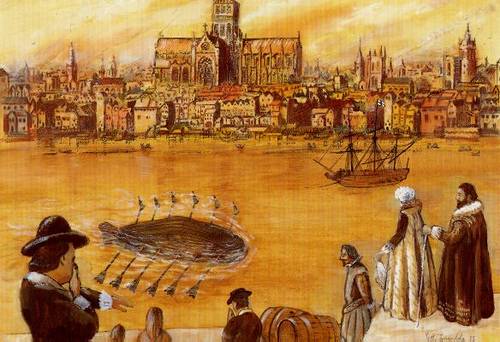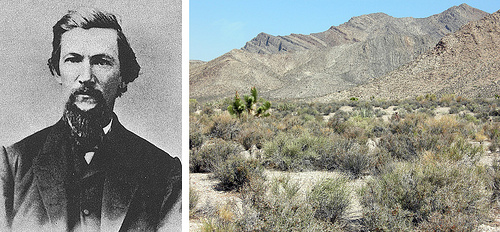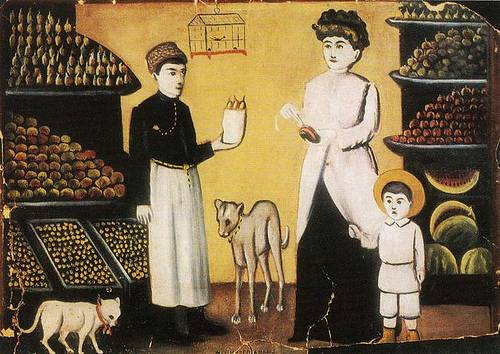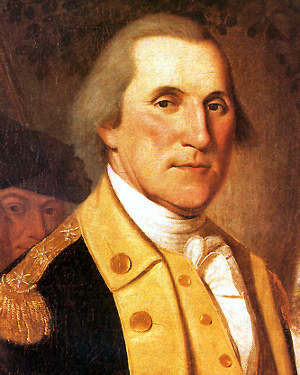- 2737 = (2 × 7)3 – 7
- Move the C in CABARET and you get A BAR, ETC.
- Van Gogh sold only one painting in his lifetime.
- “He who hesitates is last.” — Mae West
- If a man is convinced he has hypochondria, is he a hypochondriac?
(Thanks, Ben.)
(Thanks, Ben.)

The first navigable submarine appeared in 1620. Dutch inventor Cornelius Drebbel covered a wooden frame with greased leather to make a watertight, steerable craft for the Royal Navy; within four years he’d produced an “invisible eel” large enough to accommodate 12 oarsmen and remain 15 feet underwater for three hours. It’s said he even took James I on a test dive in the Thames, making him the first monarch to travel underwater.
It’s not clear how Drebbel avoided carbon dioxide buildup. An acquaintance of Robert Boyle who had sailed on the sub said the inventor produced a “chemical liquor” that would “cherish the vital flame residing in the heart.” Possibly he had found a way to produce oxygen gas by heating nitre.
Drebbel’s sub never saw action, but it was centuries ahead of its time. As late as 1901 H.G. Wells wrote, “I must confess that my imagination, in spite even of spurring, refuses to see any sort of submarine doing anything but suffocate its crew and founder at sea.”
unbe
v. to cause not to be
A 1784 letter from Ben Franklin to Benjamin Webb, an American in France who had applied for his aid:
Dear Sir,
I received yours of the 15th Instant, and the Memorial it inclosed. The account they give of your situation grieves me. I send you herewith a Bill for Ten Louis d’ors. I do not pretend to give such a Sum; I only lend it to you. When you shall return to your Country with a good Character, you cannot fail of getting into some Business, that will in time enable you to pay all your Debts. In that Case, when you meet with another honest Man in similar Distress, you must pay me by lending this Sum to him; enjoining him to discharge the Debt by a like operation, when he shall be able, and shall meet with another opportunity. I hope it may thus go thro’ many hands, before it meets with a Knave that will stop its Progress. This is a trick of mine for doing a deal of good with a little money. I am not rich enough to afford much in good works, and so am obliged to be cunning and make the most of a little. With best wishes for the success of your Memorial, and your future prosperity, I am, dear Sir, your most obedient servant,
B. Franklin.

Journalist Dan De Quille meant only harmless fun with his 1865 story “The Traveling Stones of Pahranagat Valley,” a tale of mysteriously moving stones in the Nevada desert. When placed on a level surface, he had written, the strange stones would move toward a common center and form a clutch, “like a lot of eggs in a nest.”
Reportedly the account caused a furor among German scientists, and P.T. Barnum offered De Quille $10,000 for a set of the strange stones. He put them off, but the legend spread. In response to an 1871 inquiry, he wrote, “We have none of said rolling stones in this city at present but would refer our Colorado speculator to Mark Twain, who probably still has on hand fifteen or twenty bushels of assorted sizes.” (Twain and De Quille had been roommates at Virginia City.)
Still the inquiries came. Finally, seven years later, De Quille learned his lesson and confessed. “We are now growing old, and we want peace. We desire to throw up the sponge and acknowledge the corn; therefore we solemnly affirm that we never heard of any such diabolical cobbles as the traveling stones of Pahranagat — though we still think there ought to be something of the kind somewhere in the world.”
Ironically, less than 200 miles away, there were.

The Journal of Recreational Mathematics published this remarkable magic square, composed by “a puzzlist who at the time was a prison inmate.”
The large 13 × 13 square is magic — that is, each row and column adds to the same sum — but so is each successive nested square, from 11 × 11 down to 3 × 3.
The magic constant of each square is 10,874 smaller than the last.
And every cell is prime.

DISCOUNTER INTRODUCES REDUCTIONS is a coherent sentence composed entirely of 10-letter anagrams.
In 1970, each political candidate in Oregon could specify a 12-word slogan to be printed under his name on the ballot.
Frank Hatch of Eugene, who was running as a Democrat for Congress, chose this:
“Anyone who thinks in 12-word slogans should not be on this ballot.”
From Henry Dudeney:
Two men are seated at a square-topped table. One places an ordinary cigar (flat at one end, pointed at the other) on the table, then the other does the same, and so on alternately, a condition being that no cigar shall touch another. Which player should succeed in placing the last cigar, assuming that they each will play in the best possible manner? The size of the table top and the size of the cigar are not given, but in order to exclude the ridiculous answer that the table might be so diminutive as only to take one cigar, we will say that the table must not be less than 2 feet square and the cigar not more than 4-1/2 inches long. With those restrictions you may take any dimensions you like. Of course we assume that all the cigars are exactly alike in every respect. Should the first player, or the second player, win?
Geoffrey Mott-Smith writes, “I cannot resist narrating that I first became acquainted with this gem while reading in bed, and that like an illustrious precursor I startled the household by jumping out of bed, dancing about crying ‘Eureka! Eureka!'”
What had he seen?

Shortly after the American Revolution, a movement arose urging George Washington to declare himself king.
The general rejected the scheme as “big with the greatest mischiefs that can befall my country.”
This brought him an unlikely admirer: George III remarked that refusing a crown would make Washington “the greatest man in the world.”